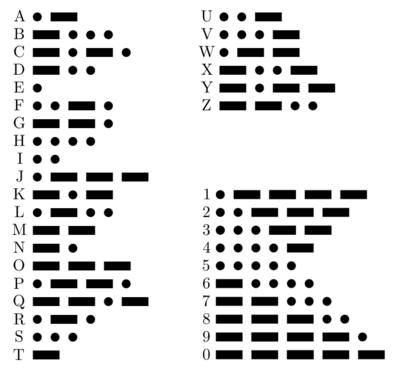http://apfelmus.nfshost.com/articles/fun-with-morse-code.html
First, we use an association list.
text = "-.-. --.- @ -.. . @ .--- .... .---- --- --- -.. @ -.-"
dict :: [(String, Char)]
dict =
[(".-" ,'a'),
("-..." ,'b'),
("-.-." ,'c'),
("-.." ,'d'),
("." ,'e'),
("..-." ,'f'),
("--." ,'g'),
("...." ,'h'),
(".." ,'i'),
(".---" ,'j'),
("-.-" ,'k'),
(".-.." ,'l'),
("--" ,'m'),
("-." ,'n'),
("---" ,'o'),
(".--." ,'p'),
("--.-" ,'q'),
(".-." ,'r'),
("..." ,'s'),
("-" ,'t'),
("..-" ,'u'),
("...-" ,'v'),
(".--" ,'w'),
("-..-" ,'x'),
("-.--" ,'y'),
("--.." ,'z'),
("-----",'0'),
(".----",'1'),
("..---",'2'),
("...--",'3'),
("....-",'4'),
(".....",'5'),
("-....",'6'),
("--...",'7'),
("---..",'8'),
("----.",'9'),
("@" ,' ')]
decodeLetter :: String -> Char
decodeLetter code = maybe ' ' id $ lookup code dict
decode = map decodeLetter . words
main = do
print $ decode text
The function words breaks a string up into a list of words, which were delimited by
white space.
-- https://www.haskell.org/onlinereport/standard-prelude.html
words :: String -> [String]
words s = case dropWhile Char.isSpace s of
"" -> []
s' -> w : words s''
where (w, s'') = break Char.isSpace s'
Using a string “@” for a word space is not elegant, and there should be a better way.
The output will be:
"cq de jh1ood k"

